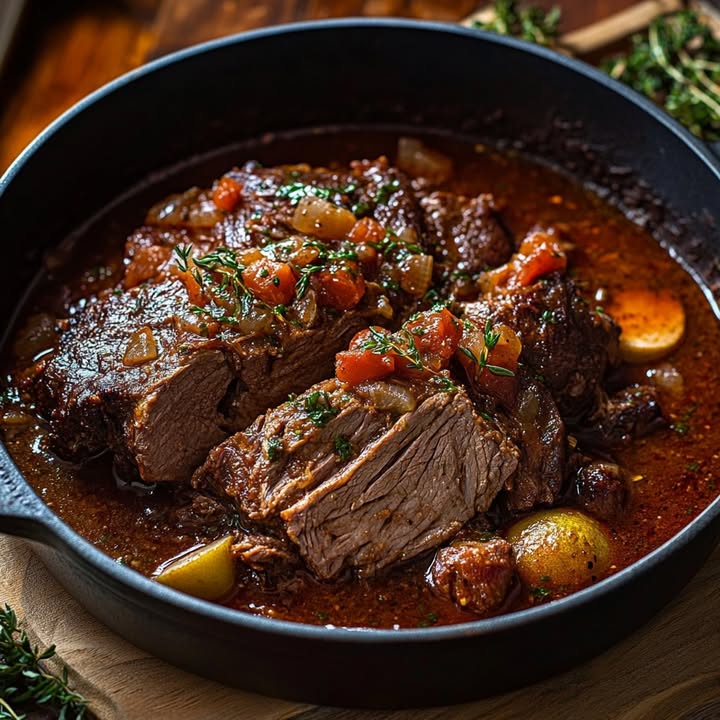
A Slow-Cooked Dream: Meet Stracotto Rôti de Bœuf à l’Italienne
Picture this: a Sunday afternoon, the smell of rich, slow-cooked beef filling your kitchen, and the promise of a meal so tender it practically melts in your mouth. That’s what happened when I first made Slow-Cooked Beef Stracotto, an Italian classic that quickly became a family favorite. This dish is all about patience—letting flavors deepen and textures soften over hours of gentle cooking. The result? Pure comfort food magic. Oh, and here’s a fun fact: it tastes even better the next day! Keep reading to discover why this recipe deserves a spot in your dinner rotation.
The Story Behind Stracotto
Stracotto hails from Italy, where “stracotto” literally means “overcooked.” Don’t let the name fool you—it’s a term of endearment for dishes cooked low and slow until they’re impossibly tender. Traditionally, this dish was prepared with tougher cuts of meat, like shoulder or brisket, transforming them into something luxurious through time and care. I stumbled upon this recipe while visiting a friend in Tuscany. Her grandmother served it with homemade pasta, and it was love at first bite. Back home, I tweaked it slightly, adding a touch of basil for freshness. Trust me, this dish is a hug on a plate.
Why You’ll Fall Head Over Heels for This Recipe
What makes Slow-Cooked Beef Stracotto stand out? First, it’s incredibly forgiving. Even if you’re not a pro in the kitchen, this recipe guides you every step of the way. Second, the flavors are bold yet comforting—a mix of savory, herby, and slightly tangy notes. Plus, it’s perfect for feeding a crowd without breaking a sweat. Did I mention how easy cleanup is? Just one pot does all the work. Whether you’re cooking for family or hosting friends, this dish will win hearts (and stomachs).
Perfect Occasions for Slow-Cooked Beef
This dish shines during cozy gatherings, whether it’s a holiday feast or a casual weekend dinner. Imagine serving it on a chilly evening with a side of crusty bread or creamy mashed potatoes. It’s also ideal for potlucks because it reheats beautifully. And hey, if you’re looking for a make-ahead meal to simplify your weeknights, this is it. Trust me, your future self will thank you.
Ingredients You’ll Need
- 1 kg to 1.5 kg of beef roast (shoulder or chuck)
- Salt and pepper to taste
- 2 tablespoons olive oil
- 1 onion, finely chopped
- 2 carrots, diced
- 2 celery stalks, sliced
- 4 garlic cloves, minced
- 2 tablespoons tomato paste
- 1 teaspoon red chili flakes (optional)
- 1 teaspoon dried oregano
- 1 teaspoon dried thyme
- 2 bay leaves
- 800 ml canned crushed tomatoes
- 250 ml beef broth or water
- ¼ cup fresh basil, chopped
- Parmesan cheese for garnish (optional)
Substitutions and Swaps
If you can’t find beef shoulder, chuck roast works just as well. For a vegetarian twist, try using mushrooms or lentils instead of meat. Swap out the beef broth for vegetable stock to keep things plant-based. No fresh basil? A pinch of dried basil will do in a pinch. If you’re spice-averse, skip the chili flakes altogether. Flexibility is key here!
Step 1: Searing the Beef
Start by seasoning your beef generously with salt and pepper. Heat olive oil in a large Dutch oven over medium-high heat. Once shimmering, add the beef and sear it on all sides until golden brown. This step locks in flavor and gives the dish its signature richness. Pro tip: Don’t rush the sear—patience pays off here.
Step 2: Softening the Vegetables
Remove the beef and set it aside. In the same pot, toss in the onions, carrots, and celery. Cook them for 6–8 minutes until softened and fragrant. Add the garlic, tomato paste, herbs, and spices, stirring everything together for another minute. The aroma will be intoxicating—think earthy, herbal, and slightly spicy.
Step 3: Building the Sauce
Pour in the crushed tomatoes and beef broth, scraping up any browned bits from the bottom of the pot. These little bits are flavor gold! Return the beef to the pot, bring it to a boil, then reduce the heat to low. Cover and let it simmer gently, allowing the flavors to meld and the meat to become fork-tender.
Step 4: Finishing Touches
After 3–4 hours of slow cooking, remove the beef and shred it lightly with two forks. Stir it back into the sauce and sprinkle in the fresh basil. Taste and adjust seasoning if needed. Chef’s tip: Letting the dish rest for 10 minutes before serving allows the flavors to settle beautifully.
Cooking Times and Patience
Prep Time: 20 minutes
Cook Time: 3–4 hours
Total Time: About 4 hours
Yes, it takes time, but trust me, the wait is worth it. Slow cooking transforms tough cuts into melt-in-your-mouth perfection.
Chef’s Secret
Here’s my little trick: add a splash of red wine to the pot along with the tomatoes. It adds depth and complexity that elevates the entire dish. Try it—you won’t regret it!
An Interesting Fact
In Italy, stracotto is often served during festive occasions like Christmas or Easter. Its hearty nature makes it a symbol of abundance and celebration. Serve it with pride—it’s steeped in tradition!
Necessary Equipment
- Dutch oven or heavy-bottomed pot with lid
- Tongs for handling the beef
- Wooden spoon for stirring
- Sharp knife for chopping veggies
How to Store Leftovers
Refrigeration: Store leftovers in an airtight container for up to 3 days. Reheat gently on the stovetop or in the microwave.
Freezing: Portion the dish into freezer-safe containers and freeze for up to 3 months. Thaw overnight in the fridge before reheating.
Pro Tip: Freeze individual portions for quick lunches or dinners.
Tips and Advice
Use a meat thermometer to ensure the beef reaches an internal temperature of 195°F for maximum tenderness. Don’t skimp on the fresh basil—it adds brightness to balance the rich flavors. Lastly, serve with crusty bread to soak up every last drop of sauce.
Presentation Ideas
Garnish with freshly grated Parmesan and a drizzle of olive oil for elegance. Serve atop creamy polenta or alongside roasted vegetables for a pop of color. A sprig of fresh basil makes a lovely finishing touch.
Healthier Alternatives
- Leaner Meat: Use lean beef cuts or turkey for fewer calories.
- Low-Sodium Broth: Reduce sodium content by opting for low-sodium broth.
- Veggie-Packed Version: Add zucchini or spinach for extra nutrients.
- Gluten-Free Option: Serve with gluten-free pasta or quinoa.
- Herb Boost: Double the herbs for more flavor without added fat.
- Plant-Based Swap: Replace beef with jackfruit or lentils.
Mistake 1: Skipping the Sear
Not browning the beef properly robs the dish of depth and caramelization. Take your time to achieve a deep brown crust—it’s the foundation of flavor.
Mistake 2: Rushing the Simmer
Turning up the heat speeds things up but ruins the texture. Low and slow is the mantra here. Patience ensures fork-tender results.
Mistake 3: Overcrowding the Pot
Cooking too much meat at once lowers the temperature and steams rather than sears. Work in batches if needed.
FAQs
Can I use a slow cooker?
Absolutely! Brown the beef and veggies on the stove first, then transfer everything to a slow cooker and cook on low for 8–10 hours.
What cut of beef is best?
Chuck roast or beef shoulder works wonders due to their marbling, which breaks down during cooking.
Can I omit the chili flakes?
Yes, they’re optional. Leave them out if you prefer milder flavors.
How do I know when it’s done?
The beef should easily shred with a fork. If it resists, give it more time.
Is this dish kid-friendly?
Definitely! Kids love the tender meat and flavorful sauce.
Final Thoughts
Slow-Cooked Beef Stracotto is more than just a recipe—it’s a labor of love that brings people together. From its humble beginnings in Italian kitchens to your dining table, this dish proves that simple ingredients can create extraordinary meals. So grab your apron, pour yourself a glass of wine, and get ready to wow your loved ones with this timeless classic. Happy cooking!

Slow-Cooked Beef
Ingredients
Equipment
Method
- Season the beef generously with salt and pepper.
- Heat olive oil in a large Dutch oven over medium-high heat.
- Sear the beef on all sides until golden brown, then set aside.
- In the same pot, cook the onions, carrots, and celery for 6–8 minutes until softened.
- Add minced garlic, tomato paste, herbs, and spices; stir for another minute.
- Pour in crushed tomatoes and beef broth, scraping up browned bits from the pot.
- Return the beef to the pot, bring to a boil, then reduce heat to low and cover.
- Simmer gently for 3–4 hours until the beef is fork-tender.
- Remove the beef, shred it with two forks, and stir back into the sauce with fresh basil.
- Rest for 10 minutes before serving.
